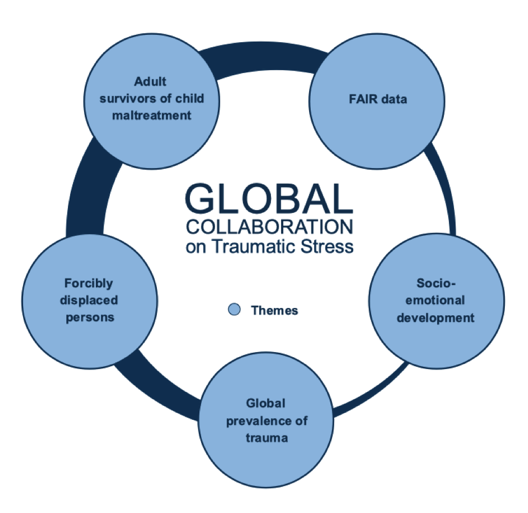Our society is a partner in the Global Collaboration on Traumatic Stress (https://www.global-psychotrauma.net/).
The Global Collaboration on Traumatic Stress consists of researchers and clinicians representing traumatic stress societies worldwide who work together on traumatic stress topics of global importance.
As part of a package of global activities the Global Collaboration on Traumatic Stress was initiated by ISTSS in 2012 (See Olff, 2014; 2015; Schnyder, 2013, Schnyder & Olff, 2013, Schnyder, et al., 2017) when the global project team with representatives from eight traumatic stress societies first met and decided on the first topics to collaborate on.
The aims of the Global collaboration are:
“To identify objectives, facilitate development, and coordinate activities of global importance [..] the community of traumatic stress researchers and practitioners should develop collaborations, and ultimately structures, that would enable them to optimally respond to those tasks that are best addressed by means of international collaboration” (Schnyder et al., 2017).
Currently, the Global Collaboration on Traumatic Stress works on five themes with projects addressing important global traumatic stress issues.
 If you would like to stay informed about ongoing projects, please register for the Global Collaboration on Traumatic Stress newsletter and social media.
If you would like to stay informed about ongoing projects, please register for the Global Collaboration on Traumatic Stress newsletter and social media.
To register for the newsletter: https://fr.global-psychotrauma.net/register
To follow on Bluesky: https://bsky.app/profile/gtrauma.bsky.social
Members are invited to explore the themes and projects and participate where possible. To learn more, click here.
For specific interest in one of the projects, find out more on the projects page:
Types of trauma | Global Collaboration (global-psychotrauma.net)
The following professional societies are currently partnering in the Global Collaboration on Traumatic Stress:
- Asociación Chilena de Estrés Traumático (ACET)
- Australasian Society for Traumatic Stress Studies (ASTSS)
- Canadian Psychological Association Traumatic Stress Section (CPA TSS)
- European Society for Traumatic Stress Studies (ESTSS)
- Deutschsprachige Gesellschaft für Psychotraumatologie (German language Society for Psychotraumatology, DeGPT)
- International Society for Traumatic Stress Studies (ISTSS)
- Japanese Society for Traumatic Stress Studies (JSTSS)
- Korean Society for Traumatic Stress Studies (KSTSS)
- Sociedad Argentina de Psicotrauma (SAPsi)
- South African Society for Traumatic Stress Studies (SA-STSS)
Chair: Miranda Olff
Co-Chair: Ulrich Schnyder
(Full Steering committee is listed here)
For more see Partners. Other groups engaged in traumatic stress related issues are welcome.
